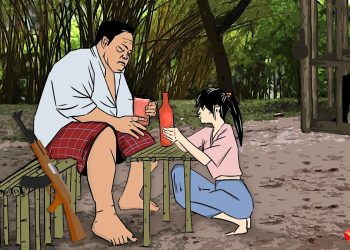NAYPYITAW—The President’s Office spokesperson U Zaw Htay has responded to criticism from the opposition party Union Solidarity and Development Party (USDP)’s on the recent presidential pardon, saying the party should have examined the case properly before making their criticisms.
The National Unity Party, the National Political Alliance League and the USDP held a joint press conference on Wednesday in Naypyitaw, at which they criticized various sectors of the current government.
“If they want to criticize [the government], I would like to urge them to study the situation carefully before proceeding with their criticism. If their criticism violates a particular law, then they will have to suffer a lot. Now I would like to warn them that their remarks are defamatory to the current government, the Home Affairs Ministry and the authorities,” U Zaw Htay told The Irrawaddy.
U Kyaw Swe of the National Unity Party said that prisoners were released unconditionally without prior consultation with the National Defense and Security Council (NDSC).
The NDSC is an 11-member body established in March 2011 which takes responsibility for security and defense affairs in Myanmar.
The country’s military chief appoints five of the council members and controls six votes, as the council comprises the president, the military’s commander-in-chief, both vice presidents, the foreign affairs minister, speakers of the upper and lower houses of the Union Parliament, the deputy military chief and the military-appointed ministers of home affairs, defense and border affairs.
“If an amnesty is to be granted, [the government] has the responsibility to hold prior consultation with the NDSC, but nobody was consulted. [The government] freed them recklessly. Even those who were given triple death penalties were freed. Unrestricted authority was practiced,” said U Kyaw Swe who said many of those released did not deserve to be pardoned considering the crimes they had committed.
To mark the Myanmar New Year in April, a total of 23,003 local prisoners and 16 foreign prisoners were released in three batches through a presidential pardon.
However, it led to prison riots in a number of prisons across the country including in Shwebo, Kale, Hpa-an, Myitkyina, Dawei, Tharyawady and Pathein where inmates complained that there was no equality in presidential pardon.
U Kyaw Swe criticized the unconditional release of prisoners, saying they may be encouraged to commit the same offence again, unlike a release on parole, in which any parole violation can result in them returning to jail.
U Zaw Htay refuted the claim that those who were given triple death sentences were released in the presidential pardon. He said that the pardon was targeted at those serving their time for drug offenses.
The President’s Office instructed the Home Affairs Ministry to make a list mainly of old and young prisoners and those who were imprisoned for possessing less than 100 yaba pills, he said.
“We understand that political parties will engage in politics. There has been a question since the time of Gen. Aung San whether politics itself is dirty or if politicians are dirty. We would like to warn them not to speak irresponsibly based on false information and that from Facebook,” said U Zaw Htay.
President U Win Myint’s pardon was granted in line with the 2008 Constitution, and it was therefore in line with the law. However, transparency in the pardon was weak as his statement failed to clarify which convictions were considered commutable and under which conditions the sentences were commuted, said former prison warden U Khin Maung Myint.
“The government has not been able to properly inform the public about which charges were eligible for pardon, and how many years could be commuted. Some inmates who were given the same sentence under same charge were released while others remain in prison. The main offenders were released while their accomplices remain in prison. These led to prison riots,” he told The Irrawaddy.
Many of the inmates has suffered from injustices of the judicial system and police procedures under successive governments. As their grievances have grown over time, their anger exploded when they were excluded from the presidential pardon, he said.
“However, we can’t conclude from this that the NLD government has poor management. Finding each other’s faults will not help either side in finding a solution. What should be done is to find a durable solution to prevent this [in the future],” he said.
U Zaw Htay said the release process was mainly carried out by the Prison Department under the supervision of the Home Affairs Ministry. Appeals submitted to the President and the State Counselor were also taken into consideration in the release, he added.
Though prison riots in other prisons could be quelled, at Shwebo Prison in Sagian Region four inmates died and two were injured during the prison riot. According to prison authorities, the live broadcasting of prison riots and simultaneous, fatal prison riots never happened before under military government or U Thein Sein’s administration.
Translated from Burmese by Thet Ko Ko.
You May Also Like These Stories:
Two Political Prisons Released in Second Amnesty, More to be Announced
Latest Presidential Amnesty Includes Dozens of EAO Members, Accused Associates
















